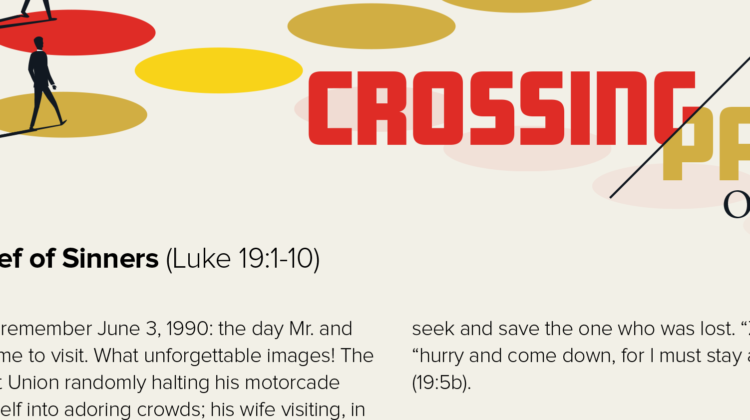
Formerly Chief of Sinners (Luke 19:1-10)
Many Minnesotans remember June 3, 1990: the day Mr. and Mrs. Gorbachev came to visit. What unforgettable images! The leader of the Soviet Union randomly halting his motorcade and launching himself into adoring crowds; his wife visiting, in her words, a “typical middle-class family” in Minneapolis.
The family of six welcomed Mrs. Gorbachev into their home while six thousand people gathered outside. Some of them climbed trees to get a better look. All of them wondered—as I wondered, watching it on TV when I was ten years old—what made this family worthy to host such a distinguished guest. One reporter for the national news noted that their yard needed to be mowed and had too many dandelions. Their weeds made the headlines!
On the day Jesus “entered Jericho and was passing through” (Luke 19:1), the people in town may have asked themselves if He needed a place to stay. Jerusalem, His destination, was a day’s walk ahead, all of it uphill work. If they wondered which of them might receive the honor, they didn’t wonder if it would be Zacchaeus. They knew he was unworthy to host the Lord, and the reason why went far beyond an unkempt lawn: “He was a tax collector and was rich” (v. 2b).
The people’s actions revealed their thoughts the day Jesus came to visit. They lined the road and, like all good citizens of Jericho, formed a wall. They occupied the “moral high ground” and looked down on the man who was “small in stature” (v. 3b). They tried to keep his path and the Savior’s path from crossing. (We’ll see another example of this next time.) They proved Jesus’ point, which He had made in the previous chapter of Luke’s Gospel: “How difficult it is for those who have wealth to enter the kingdom of God” (18:24)!
The people of Jericho could’ve named ninety-nine people more righteous than Zacchaeus: ninety-nine more worthy to welcome the Lord into their home. Unwittingly, they proved another point Jesus had made: “Behold, some are last who will be first, and some are first who will be last” (Luke 13:30). The Son of Man looked beyond their hatred and looked over their heads into the sycamore tree. He left the ninety-nine to seek and save the one who was lost. “Zacchaeus,” He said, “hurry and come down, for I must stay at your house today” (19:5b).
The crowd’s response to the love of Christ was predictable. They all grumbled, “He has gone in to be the guest of a sinner” (v. 7; see Luke 5:30, 7:34, 15:1-2). The “sinner’s” response, however, was something new and spontaneous.
Zacchaeus stood and said to the Lord, “Behold, Lord, the half of my goods I give to the poor. And if I have defrauded anyone of anything, I restore it fourfold” (v. 8). Without shame, the chief tax collector confessed his former way of life as chief of sinners. Without shame, he confessed his repentance and faith in Jesus. The chief way he would show his repentance wouldn’t involve retiring from his position or moving to a different town, actions which, according to the world’s way of thinking, would’ve been wise. No, the chief fruit of his faith would be love for his neighbors, expressed in generosity far beyond what any law prescribed.
When the Lord called up to Zacchaeus and called him by name, the Holy Spirit went to work in the sinner’s heart. Zacchaeus obeyed the Lord’s command and opened his home to Him with joy. Though we don’t know how long Jesus stayed with Zacchaeus, He promised that He would abide with him in the fullness of His grace: “Today,” declared the Lord, “salvation has come to this house” (v. 9a).
That the Son of Man should seek and save us when we were lost and unworthy and unwilling to be found; that the Son of God should suffer and die for our sins; that the Risen Savior should desire to dwell in our hearts and homes; “such knowledge is too wonderful for me; it is high; I cannot attain it” (Psalm 139:6). Thanks be to Jesus, who has come down to us! He has not overlooked us or passed us by. He calls us by name, and we are His! Truly His love “has broken every barrier down” (ELH 319:6)!
Rev. Christian Eisenbeis